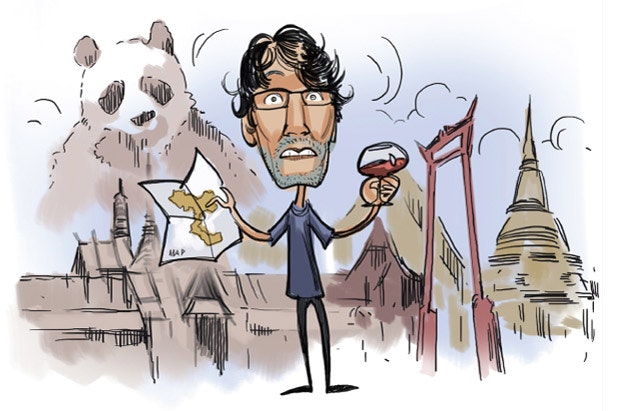I’m a little sad today. Of all the utterly fabulous experiences I have been introduced to by Chiang Mai, my absolute favourite is now over for another year. The greatest celebration of fun in the world ever, the festival of Songkran, is over. My flowery shirt is back in the closet and my water gun stowed in the rack. Even the inevitable physical results of a short dip in the moat are beginning to subside, and it’s back to life as usual (whatever that means) in The Rose of the North.
A denizen of Chiang Mai often falls into one of two camps: A champion of Songkran or a lover of Loy Kratong. I fall into the former camp. Not because a day of blowing stuff up and setting fire to things isn’t absolutely marvellous, its just that three days of water warfare with thousands of strangers is awesome, and I use that word in its proper sense. It is impossible to spend at least one moment out amongst the flowery shirts and the constant bombardment of moat-flavoured water not to stand back, look at the crowds of splashing combatants, and feel awe.
“Why don’t we have Songkran at home, it’s bloody brilliant?” is a question asked by every foreign water-throwing virgin at least once as they settle into a bar after retiring from yet another bout of liquid carnage. The answer is pretty similar to the one I give when asked why I choose to reside in Thailand: Because the people who run your lives at home quite simply wouldn’t allow it.
Living in Thailand means self-reliance. What I give up in rights here as a foreigner I gain in a massive amount of freedom. And this is sort of what Songkran is – it’s a time when people are free to drink beer, dress in fabulous shirts and throw buckets of water at each other. And that immediately contravenes about a gazillion health and safety regulations in most other countries. But this is something I find so glorious about the water festival; it is pretty much unregulated and proves that when thousands of people choose of their own free will to flock onto the streets armed with futuristic looking water weapons, it doesn’t actually result in anarchy (something I’ll bet most governments would be petrified of). Instead it results in a massive gathering of people having (and this would also probably scare the shit out of most authorities) fun.
If there is any violence during Songkran, I’ve never seen it in my six years of taking part. I understand that there is some, as the military likes to call it, collateral damage, but the number of road deaths and drownings surely isn’t unusual, or indeed unexpected, for a festival of this size involving water. Not to say that they aren’t regrettable. But concentrating on positive news rarely sells papers – death statistics do.
Songkran really couldn’t be celebrated anywhere else else, simply because it was born in Thailand and her neighbours, just as Henley Regatta would feel wrong outside the UK and Mardi Gras belongs in New Orleans. Singapore tried to poach Songkran this year, and this understandably got Thailand’s back up. Then the city-state obviously had a bit of a panic about what it had actually promised to undertake, and announced the festival would be waterless. Thailand raised its eyebrows in astonishment and the organisers in the Asian Tiger looked a bit ridiculous.
Songkran also grabs my vote for number one party ever because it is a water fight and doesn’t try to be anything but. How marvellously simple. Fill something with water, chuck it, repeat. That’s it. It is ideal for every one of every age. And it’s never boring. In fact it’s extraordinary how it never gets boring. I have never seen any parent say: “The kids are getting bored, we need to find something for them to do,” or “Grandad’s getting tired, we need to go home now,” because Chiang Mai caters so brilliantly to a day of getting wet. The weather is scorching and there is always booze, food, shelter and a massage for those looking for some respite just metres from the carnage.
And I love Songkran because it even caters beautifully for non-water lovers. For Thais who perhaps live and work hundreds of miles away from their families and loved ones, it is a week where pretty much everything shuts down so they can go home. Imagine that in the UK, a country where a bank holiday is marked by miserable bastards complaining about how a day off for everyone costs the economy billions? Screw the economy. Everyone who believes that rubbish should be forced out into Songkran with a water pistol and a bucket to see how much more precious just a few moments of happiness are than economics invented to perpetuate misery.
If getting wet isn’t your thing, then just sit in a bar and observe. It’s magic. I defy anyone to watch for an hour and not have used every superlative in their vocabulary at least twice. People behave beautifully during Songkran and look even more beautifuler. The only time a grin isn’t spread across a person’s face is when they are concentrating on refilling their water weapon from the ubiquitous water buckets with huge ice-blocks in them outside every bar. I think that’s the thing that remains in my mind the longest. Everybody smiling. A whole city of smiles. Now that is awesome.
So, Songkran is over for another year, and I, as I suspect many of you do, intend to be around for next year’s celebrations. I cannot say with certainty whether it is the greatest festival on the planet as I have never been to Rio, Munich or New Orleans, where I hear they have some pretty good ones. But they’d have to be pretty bloody special to top the pleasure that three days in Chiang Mai during April give me.
